Upgraded Murder Charge Against Derek Chauvin Still Does Not Require Proof That He Intended to Kill George Floyd
Three other former Minneapolis police officers are now charged with aiding and abetting Chauvin.

Minnesota Attorney General Keith Ellison today announced new criminal charges against the four former Minneapolis police officers who were involved in the May 25 death of George Floyd, an incident that set off protests across the country. Ellison upgraded an earlier charge against Derek Chauvin, who kneeled on Floyd's neck for nearly nine minutes while arresting him for passing a counterfeit $20 bill, and for the first time charged three other officers who were also at the scene, two of whom helped pin Floyd to the pavement.
Local prosecutors previously charged Chauvin with third-degree murder, which is punishable by up to 25 years in prison, and second-degree manslaughter, which carries a penalty of up to 10 years. Ellison added a charge of second-degree murder, increasing the maximum sentence to 40 years.
The new charge alleges that Chauvin caused Floyd's death "while committing or attempting to commit a felony offense"—i.e., third-degree assault, which covers any attack that "inflicts substantial bodily harm." Like the earlier charges, that variety of second-degree murder does not require proof that Chauvin intended to kill Floyd.
Ellison also charged Thomas Lane, J. Alexander Kueng, and Tou Thao with aiding and abetting both second-degree murder and second-degree manslaughter. Lane and Kueng helped Chauvin restrain Floyd, while Thao was standing nearby but did not intervene. Video shows Thao pushing back a bystander who tried to help Floyd.
Local prosecutors said Lane twice suggested that Floyd should be rolled from his stomach to his side, presumably to avoid the risk of suffocation. Chauvin rejected those suggestions. He also ignored Floyd's repeated complaints that he could not breathe and the pleas of bystanders who were worried that Floyd's life was in danger.
Harvard law professor Laurence Tribe and Minnesota criminal attorney Albert Turner Goins argued that the third-degree murder charge against Chauvin was inappropriate. Minnesota law defines that offense as causing someone's death by "perpetrating an act eminently dangerous to others and evincing a depraved mind, without regard for human life." Tribe and Goins said state courts have interpreted the statute as limiting the charge to "reckless or wanton acts…without special regard to their effect on any particular person." Instead they recommended the sort of second-degree murder charge that Ellison has now filed.
Chauvin still faces the lesser charge of second-degree manslaughter, which alleges that he killed Floyd through "culpable negligence" that created "an unreasonable risk" of "death or great bodily harm." Unlike the murder charge, it does not require proof of an underlying felony.
Update: Contrary to initial press reports, the June 3 criminal complaint against Chauvin still includes the original third-degree murder charge, in addition to the second-degree murder and second-degree manslaughter charges. This post has been corrected accordingly.


Show Comments (146)